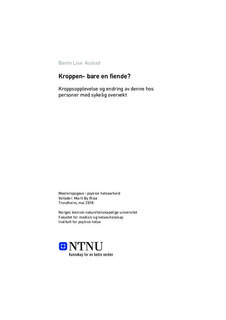Kroppen - bare en fiende? Kroppsopplevelse og endring av denne hos personer med sykelig overvekt
Master thesis
Permanent lenke
http://hdl.handle.net/11250/2571406Utgivelsesdato
2018Metadata
Vis full innførselSamlinger
- Institutt for psykisk helse [1197]
Sammendrag
Background: Many people with morbid obesity have challenges with their mental health. Sustained weight reduction after conservative treatment has proven difficult to maintain due to, for example, lack of mental stability to change living habits.
Purpose and Issue: The purpose of this study was to investigate the body experience of people with morbid obesity before and after an 8-week multidisciplinary lifestyle change program.
Method: Both quantitative and qualitative methods were used. Body experience was measured through Questionnaire on Body Experience (SKO). 69 people filled out questionnaires before and at the end of the rehabilitation program. In addition, body experience and changes were explored through individual depth interviews with four of the participants.
Results: The study showed that participants cut higher than normal for negative aspects of body experience and lower than normal on positive aspects. The body experience was improved towards the end of the rehabilitation program. However, the interviews showed that body image was fluctuating and vulnerable to internal and external conditions. Participants largely described an external focus on the body rather than experiencing themselves from within. It was new and unusual for the participants to focus on positive bodyexperiences.
Conclusion: Focus on improving body image may be a better treatment goal than weight reduction for some in this patient group. It may be useful to uncover subgroups and provide different treatment options. Alienation from one's own body can contribute to fluctuating body image and lack of lasting change. SKO can be a tool for measuring body image, and highlighting nonweight - related changes. More research on body awareness and bodyownership and the use of SKO is important for further treatment to the patient group.
